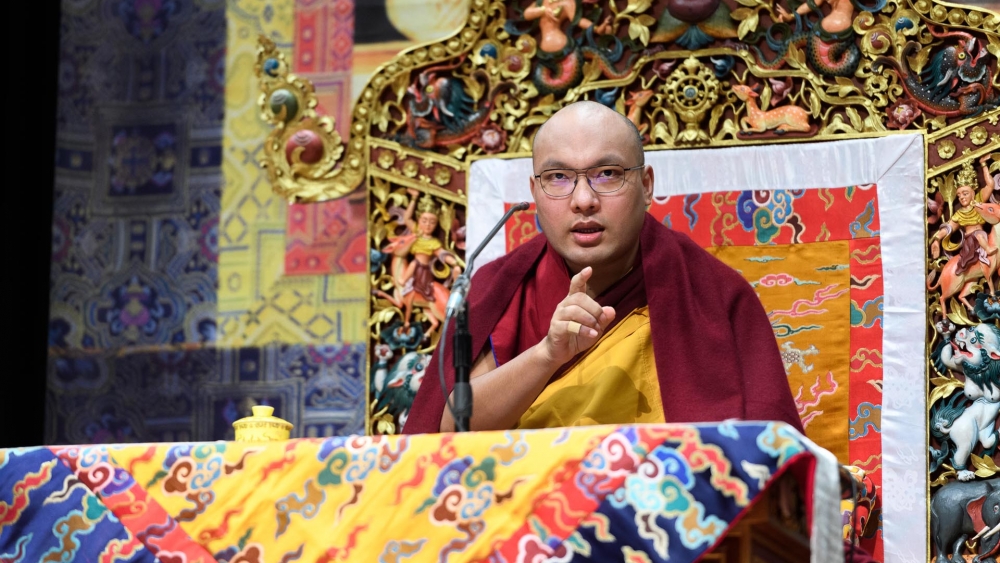The Karmapa teaches on The Eight Verses on Training the Mind, one of the most beloved texts on mind training (lojong) that distills its very essence. The author, Geshe Langri Thangpa, was a famous Kadampa teacher, who was also called, “the Serious One,” or “Gloomy Face.” Due to his compassionate focus on the suffering of living beings in samsara, he hardly ever smiled.
What is Lojong?
The core of mind training, the Karmapa explained, is to practice seeing oneself and others as equal and then to exchange oneself for them. Having studied these instructions in the main texts and practiced their teachings, Langri Thangpa condensed all of them into these eight verses.
Usually mind training does not depend on the length of the text but the concise presentation of the key points. We might read many texts and their commentaries, the Karmapa commented, but if we cannot blend these teachings with our mind, if we do not internalize them, they will not benefit us. The Kadampa lineage in general emphasizes practice over study; its teachers focused on experience rather than the intellect. Extracting the essential meaning of all the Buddha’s teachings, they put these into practice without mistake and without leaving anything left out. Each of Langri Thangpa’s verses gives one of these key instructions, as we shall see.
The first verse reads:
Considering all living beings
More precious than a wish-fulfilling gem,
To accomplish the highest aim,
I will always hold them dear.
“This initial verse,” the Karmapa summarized, “teaches that all living beings are more important than a precious wish-fulfilling jewel. Why so? They are indispensable for achieving the highest aim, the level of buddhahood. We take refuge, generate bodhicitta, and then in meditating on benefitting others and developing our bodhichitta, we become fully awakened. Since living beings assist us in this process, they are like a precious gem.”
It is not enough to know that living beings exist around us, the Karmapa counseled, we must train in taking them to be more precious than ourselves. From beginningless time, others and ourselves have existed; we have moved down through time together. Since we train in bodhicitta through relating to others, we should consider them dearer than ourselves.
And these myriad connections can be either negative or positive. Whether they are one or the other depends on the way we relate to them. We can create positive relationships, not just for temporary gains, such as food and clothing, but for expressing genuine love and compassion. If we can do this, an excellent connection is created and our bodhichitta will grow.
“Creating the right circumstances allows us to attain our goals in this life,” His Holiness stated. “From one perspective, this means a good situation in this contemporary world—education, the ability to get work done, a certain amount of good luck and so forth. But more important than all of these are the relationships we have with others. They account for 60% to 70% of whether we can accomplish our aims or not. Attaining liberation or omniscience depends on the quality of our relationships with others. Thoughts of love and compassion as well as meditating on bodhichitta are the cause for attaining full awakening. On the contrary, if the afflictions and poisons are present in our being, liberation or unchanging happiness will be impossible to find.”
The second verse reads:
When in the company of others,
I will see myself as lowest of them all,
And from the depths of my heart
Cherish others as supreme.
“The essential meaning here,” the Karmapa summarized, “is that wherever we are and whomever we are with, we should always consider ourselves lower than others and respect them from the depth of our hearts. The reason for holding ourselves lower and others higher can be illustrated by an example.
“The ocean is located at the lowest level on the planet, so all the water from the rivers and clouds flow down into it. Likewise, if we keep others higher and ourselves lower, we can receive all their qualities. On the contrary, if we are proud and think we are superior, we close off an opportunity to learn. No matter whom we might meet or befriend, this is a chance for us to educate ourselves. People have different ways of thinking and behaving, so we can always learn from them. On the other hand, if we are fixated on our own way of thinking and keep ourselves in the center of the frame, we lose the chance to expand our horizons.
“The instructions of mind training are not meant to give us difficulties, but to provide a basis for learning. Here in this verse, ‘seeing myself as the lowest of them all,’ is not meant to make us feel worthless and think, ‘I’m no good. I can’t succeed. I’m a loser.’ It is not like that. Holding ourselves lower allows us to learn. If we think of ourselves as beginners, it will open the door to knowing more. As we grow older, we can keep learning, so we need to have courage and recognize our situation as an opportunity to grow. Each person we meet can fill in what we do not know or have not yet connected with. For these reasons, we should not take this phrase ‘see myself as lowest of them all,’ literally but find the deeper meaning in it.”
The Karmapa summarized, “In the framework of mind training, meeting others provides a chance to learn and develop our bodhichitta. Without this open attitude, mind training will not be effective. And we also need a clear and powerful idea of what we are doing. If our thoughts are half-hearted, the training will not work. Whether we learn or not depends on our way of thinking and our ability to bring everything onto the path of practice.”
The third verse reads:
In everything I do, I will watch my mind.
As soon as afflictions arise,
I will face them squarely and turn them around,
For they endanger others and myself as well.
In all activities—moving, standing, sitting, and so forth—we look at what is happening in our mind, checking to see if the afflictions are arising or not. In monitoring our mind, if we spy an affliction on the rise, we immediately recognize that it is a fault and reverse it.
It is important to examine like this, especially if we are Dharma practitioners. Some people who have entered the gate of Dharma develop in ways that seem strange to people observing from the outside. Thinking, “I’m doing Dharma practice,” they become more jealous, grasping, and proud. We must look into our mind again and again, for it is not enough to simply state, “Oh yes, it is like that.” We need to analyze our mind stream clearly and repeatedly, and then correct it. In particular, if we are practicing mind training, we have to take the responsibility of being continually alert in all that we do.
As soon as an affliction starts to arise, we can encounter it directly and forcefully, stopping it in its tracks. This is not an easy thing to do. If usually we are vigilant and aware of what is transpiring in our minds, we can sense that an affliction is about to arise. Otherwise, we will not have the time to block it since it has already occurred.
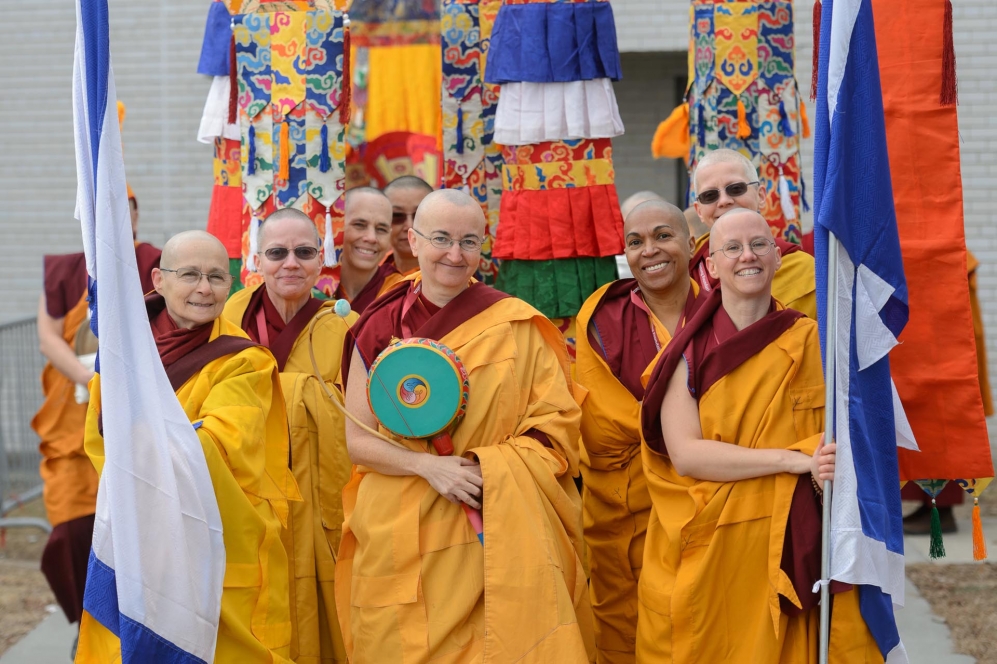
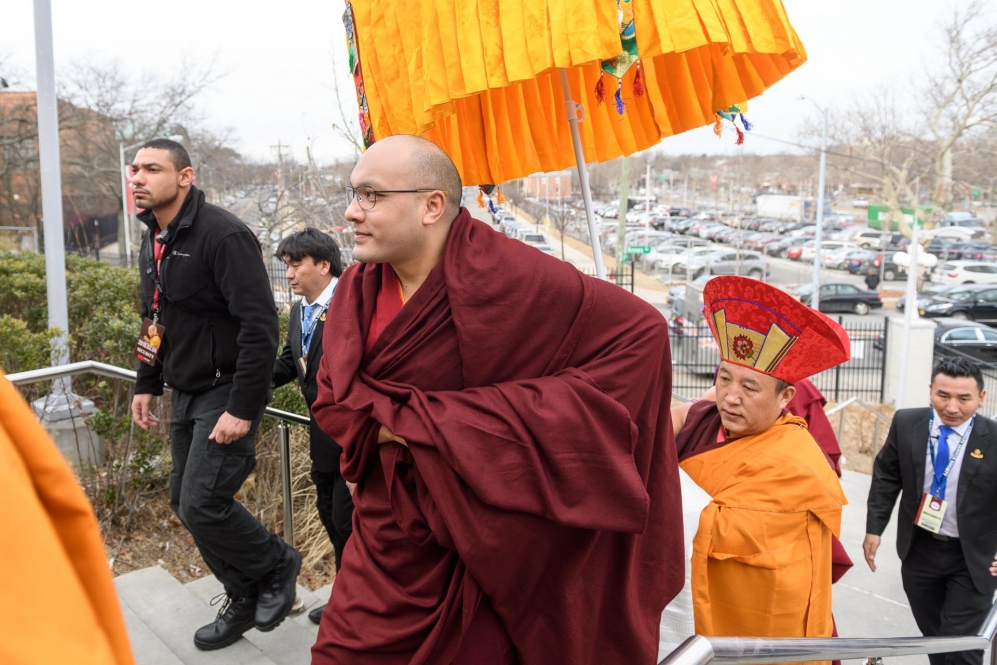

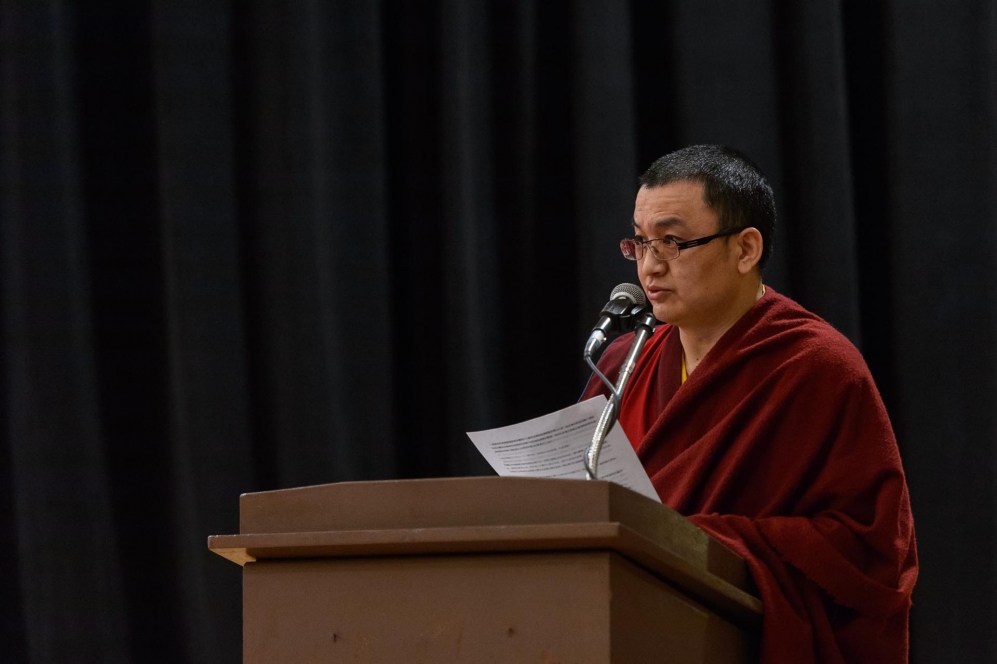
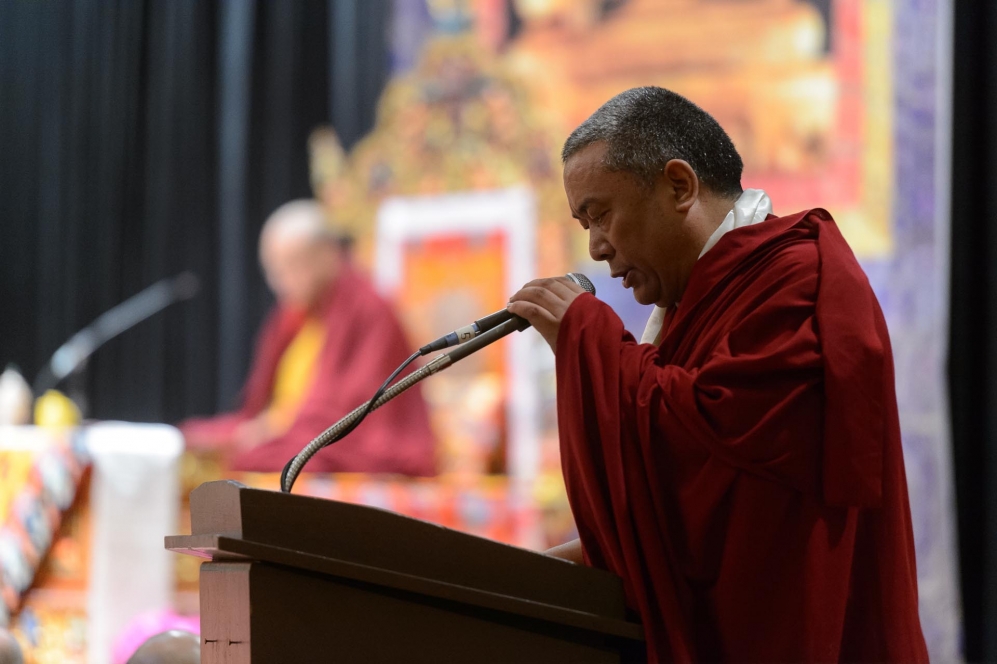
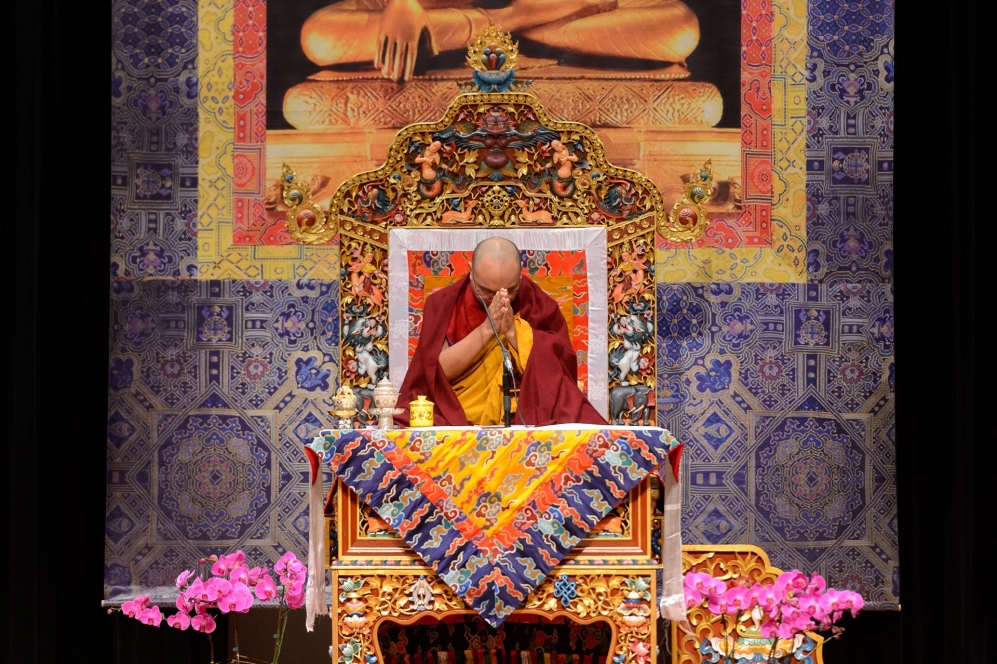
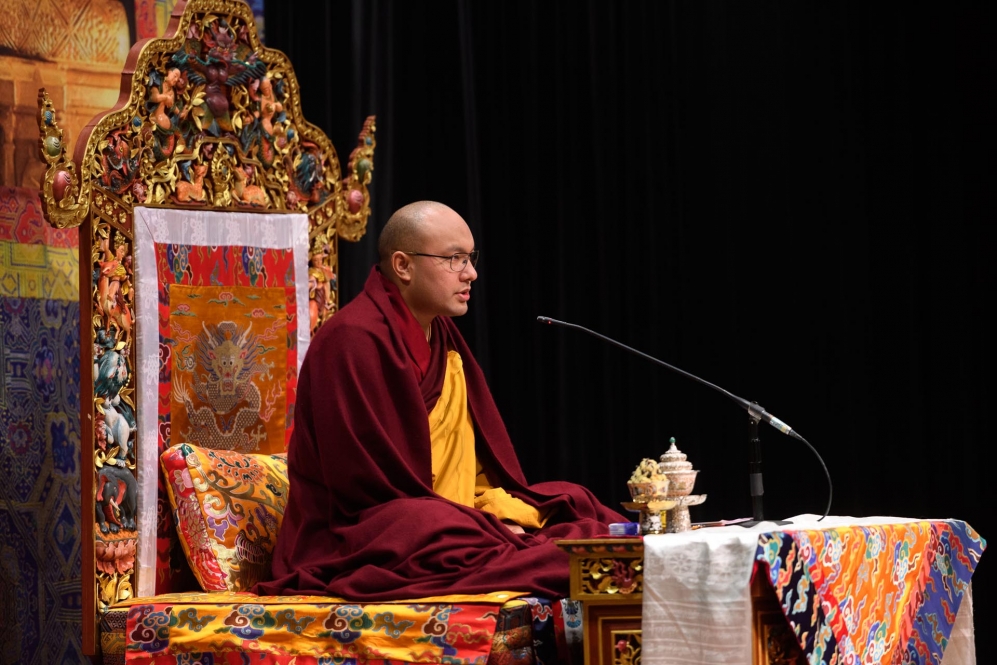

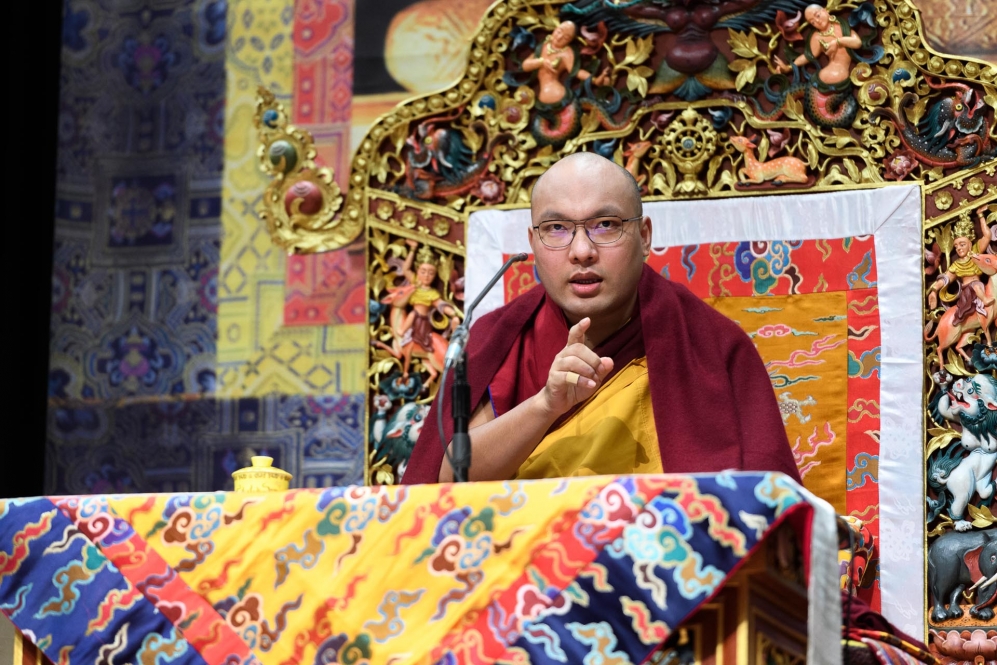

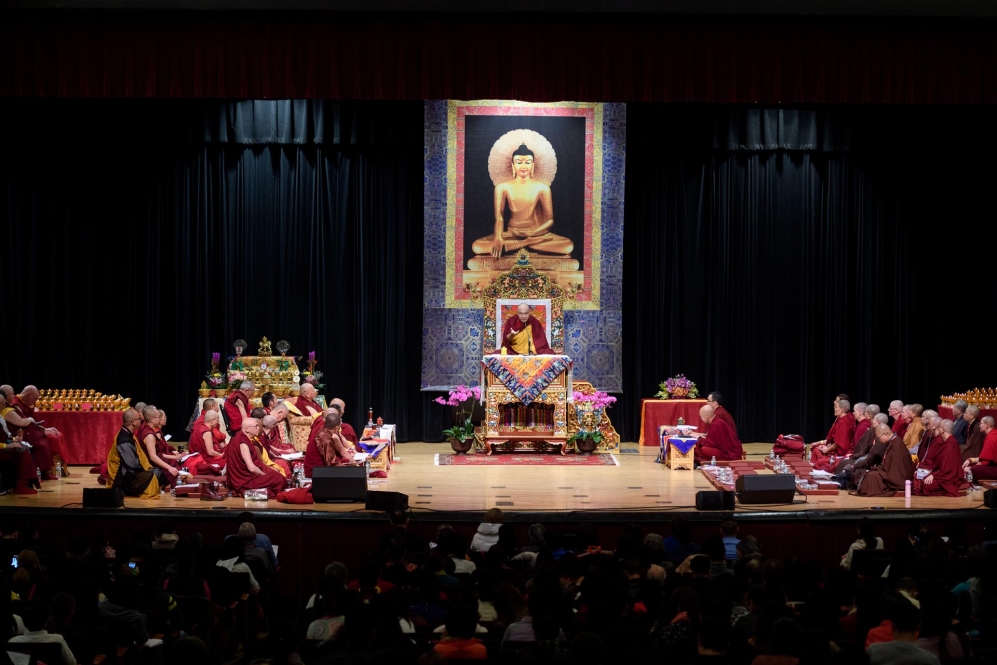
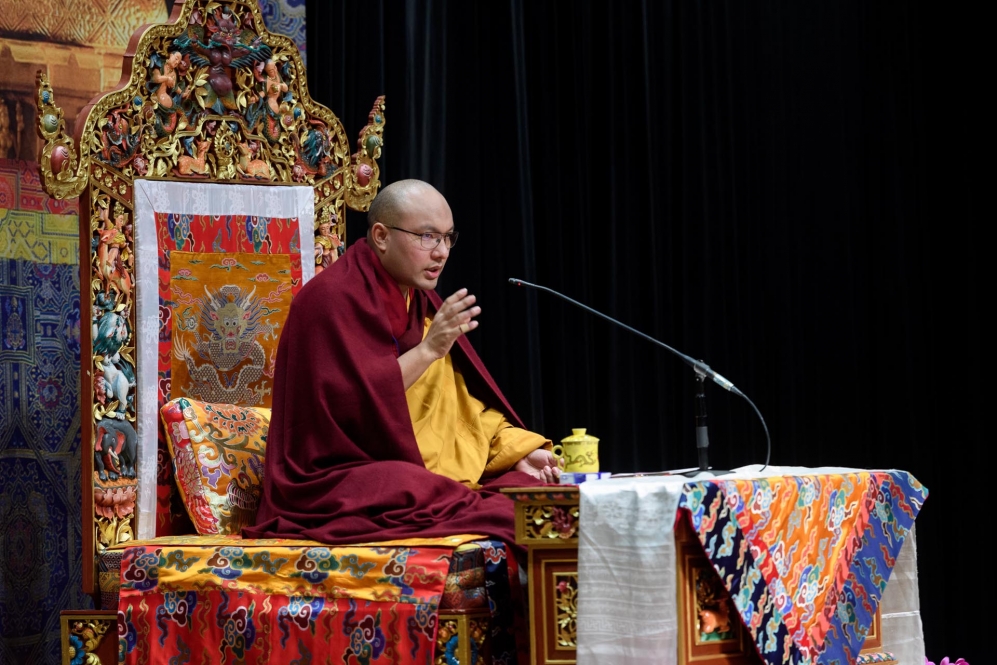
Photos from the Gyalwang Karmapa’s teachings on the 8 Verses of Mind Training in the United States of America in February, 2018.
The key point is being alert to the movement of our mind, and this will allow us the time to turn an affliction around. The Kadampa elders advised that as we are moving through our daily lives and see an affliction arising, we should immediately and forcefully press it back down. Being alert, aware, and vigilant is key.
Verse 4 reads:
Whenever I see ill-natured people
Or those oppressed by grim misdeeds and misery,
Like discovering a precious treasure,
I will cherish them as valuable and rare.
The Karmapa explained that “ill-natured people” means those who have a bad character or temperament. “Grim misdeeds” refers to great wrongdoing, very negative karma, or a malicious intent. “Misery” indicates someone experiencing intense suffering. If we encounter such people, what attitude should we have? We can see them as a precious treasure, thinking, “I have found a once in endless lifetimes’ chance to bring this situation onto the path of practice. May I bring them out of their terrible condition and place them on the level of buddhahood.”
“From the perspective of mind training,” the Karmapa continued, “it is important that we accept with joy and delight whatever type of person or situation we might meet. It is not difficult to be with people whose character resembles ours; however, encountering ill-natured individuals whose character is set far apart from ours will challenge us. If we want to put our mind training into action, we should show these difficult people respect. When they are right in front of us, giving us an opportunity to practice mind training is the time to demonstrate our mind’s courage and abilities.”
If we only feel comfortable relating to people who are easy to be with, our training will not become powerful. We need to expand the strength of our mind, the courage of our heart, and the breadth of our outlook. We can develop these abilities to the point that we are happy to meet with anyone.
We could think, “I’ll wait for this ill-natured person to appear and then I’ll practice being happy to meet them.” Or “I’ll go looking for a bad tempered individual to test my mind training.” We do not need to do this. The people near to us, our family and friends, for example, can provide a variety of difficult situations for us to practice mind training.
“But usually we do not do this with those close at hand and just let the afflictions such as anger take over, and so we miss a real opportunity to practice mind training. The time to practice is now in our everyday lives, but we put it off to some future date. This is not real training. Real training means using the problems we face as we go about our lives and not postponing these challenges to some distant future.
The fifth verse reads:
Whenever someone caught in envy
Does me wrong by scolding or demeaning me,
I will take defeat upon myself
And give victory to others.
Out of jealousy someone might use harsh words to put us down or mercilessly criticize us without any real reason. At that time, the Karmapa advised, we can take on defeat and give victory to another. In general, when we relate to ill-tempered people, their bad temper, in fact, is not ours, so it is not a problem, as it does not harm us. It is similar with someone who is suffering from illness and so forth, so we can remain in equanimity. However, someone specifically targeting us with verbal abuse and harm can trigger our afflictions, as can views that are very different from our own. How should we handle this? What should the response from our mind training be?
The Karmapa replied, “’I’ll take defeat upon myself and give victory to others’ is a well-known pith instruction of mind training. Not just following the meaning of the words, we should reflect on whom or what is it that takes the defeat or victory. The focus here is not on the person, but on the mind. We place the defeat on the mind that takes things to be real or that clings to a self and we give the victory to the mind that cares for others. In brief, we continually diminish the mind that cherishes the self and continually develop the mind that cherishes others. We could think in terms of a person, but then we would miss the opportunity to train our mind, which is the whole point of lojong.
“Let us consider the situation from another angle, in which someone berates us even though we have done nothing wrong. We are faultless and yet another ascribes faults to us and even severely criticizes us for having them. Thinking that we are practicing great compassion and helping others, we seem to take on these faults, but the result is actually an increase in our pride, as we wind up congratulating ourselves for having given such a huge profit to another.
“If someone looked at this situation from the outside, it would seem that we indeed had succeeded in our practice; however, we did not really take this defeat into our mind and so our clinging to a self has not diminished but increased. We think, ‘I did this. I’m a good practitioner.’ This semblance of practice does not benefit us because ultimately it is our mindstream that has to change. We must become able to fully exchange ourselves for another.”
Verse six reads:
Even when someone I have helped
And placed my great hopes in
Harms me most unfairly,
I’ll see them as a true spiritual friend.
“This verse speaks of someone we had helped and for whom we had great expectations,” the Karmapa commented, “and then they hurt and deceived us. This is especially painful since it is someone with whom we have an emotional connection, yet it is this very person we should consider to be our spiritual teacher.
“How should we understand the term spiritual teacher?” the Karmapa questioned. “This person is not necessarily someone whose name is widely known or who wears an impressive hat and holds a bell and dorje. An authentic spiritual teacher is one who creates the conditions that allow us to see our hidden faults, those defects that we do not usually recognize. Often when we meet a teacher, we feel delighted and happy, but the real question is: Were our faults illuminated? To develop as practitioners, we have to recognize what is wrong with us, which is difficult to do, so the real spiritual teacher is one who allows us to see our shortcomings.”
On the positive side, the Karmapa added, the spiritual teacher also shows us ways to develop qualities that we did not have before. The veil of our ignorance is parted and we come to see, “Oh yes, I’m like that.” This, however, is not easy to do since our faults outnumber our qualities. A good spiritual teacher will not reprimand us as parents do their children: “That’s not right!” “Don’t do that!” “That’s wrong!” This way of castigating others does not work. Being a good teacher means that you can clearly point out someone’s fault so that they can see it for themselves. If you cannot do this, you are not a true teacher.”
Not working with one’s faults can also be dangerous. If someone with whom you have a relationship harms you and you harbor it inside, turning it over again and again, at one point all this negativity will spill out. The spiritual teacher, therefore, points out clearly what we need to change.
The seventh verse reads:
Briefly, in direct or indirect ways,
I will help and bring happiness to all my mothers
While secretly taking upon myself
All of their hurt and suffering.
“This verse teaches the practice of exchanging self for other,” the Karmapa explained. “First we see the equality of ourselves and others and then exchange ourselves for others. The best way to do this is directly, but if that is not possible, then indirectly. We secretly give all our well-being and happiness to other living beings and secretly take on all their injury and suffering.”
There are a number of ways to explain why the practice should be kept secret, the Karmapa noted. “Since not everyone could actually do it, the early Kadampa teachers kept secret the instructions on the practice of exchanging self for others. Later it was taught more widely and the motivation was emphasized: ‘Wouldn’t it be wonderful to give all my well-being and happiness to others and take on their injury and suffering!’ In this way the practice was done so that others could not know about it.
“If the practice were not secret, there would also be a danger of performing it to impress others or make things go well for oneself. In front of others, we might say, ‘I’m doing the practice of exchanging self for other,’ and that would turn it into our credit and fame. This kind of ego-boosting is not what is being taught here, so the practice is done in secret.”
How is it then that we should think about exchanging self for other? First of all, it will not work well if we practice in a materialistic frame of mind, focusing on things and taking them to be truly existent. If we understand benefiting others as passing along everything we have, that would also be mistaken. For one thing, material resources are limited so, to take a simple example, if we have only one apple, to whom will we give it? If we offer it to one person, another person cannot have it. Our material resources are limited and cannot reach all living beings.
Therefore, we do not think in terms of things, but in terms of our body, speech, and mind, which can truly benefit others. The main practice here is to offer these three to all living beings. We work very hard, putting all our effort into developing positive qualities, so we have vast offerings to give all living beings. This brings a much greater benefit than plying them with things. Further, in this context, it would be difficult to consider giving everything away and remaining destitute as the practice of a bodhisattva.
The eighth verse reads:
I will keep all of these practices untainted
By thoughts of the eight worldly concerns.
Recognizing all things to resemble illusions,
May I be free of attachment and released from bondage.
When we are engaged in the meditations taught in these verses, we need to be very careful that our practice is not tainted by the eight worldly concerns (wishing for happiness, fame, praise, and gain while fearing their opposites, suffering, insignificance, blame, and loss). Through practice, we come to see all phenomena as illusion-like and thereby avoid mistaken ways of perceiving and understanding. In the end, we become free of attachment to things and released from anything that could bind us.
The Karmapa then spoke briefly about emptiness. “The root of our problems can be traced back to attachment, of which there are various kinds. Among them all, the one that afflicts our minds the most is grasping onto phenomena as real. We take things to exist just as they appear to us and this misapprehension creates many difficulties for us. The view that sees all phenomena as not truly existent and illusion-like, can eliminate the clinging to phenomena as real, allowing us to discover emptiness as their abiding nature.
“On the one hand, what we say about the nature of phenomena or about whether things are truly existent or not, are important statements; on the other hand, these explanations do not benefit us very much, because we should look at how our present mind is operating and whether it is changing for the better or not. Are we persisting in taking things to be real? Just thinking, ‘This is not truly existent’ will not help. We should investigate how things exist by looking at our mind. What will definitely help us is transforming the way our mind is functioning in this very moment.”
What is ignorance?
The Karmapa followed his explanation with a pertinent story of the first meeting between Gampopa (1079-1135, the founder of the Dakpo Kagyu lineage), and his disciple Geshe Phakmo Drukpa (1110-1170, a lineage holder, whose activity was the greatest among Gampopa’s disciples). Phakmo Drukpa extensively studied Buddhist philosophy and logic at a Kadampa monastic college and also received teachings from many famous lamas. During this time, he had a persistent question: “What is the root of samsara?” All his teachers gave the same response, “ignorance” and followed this with detailed explanations, which did not help his mind very much.
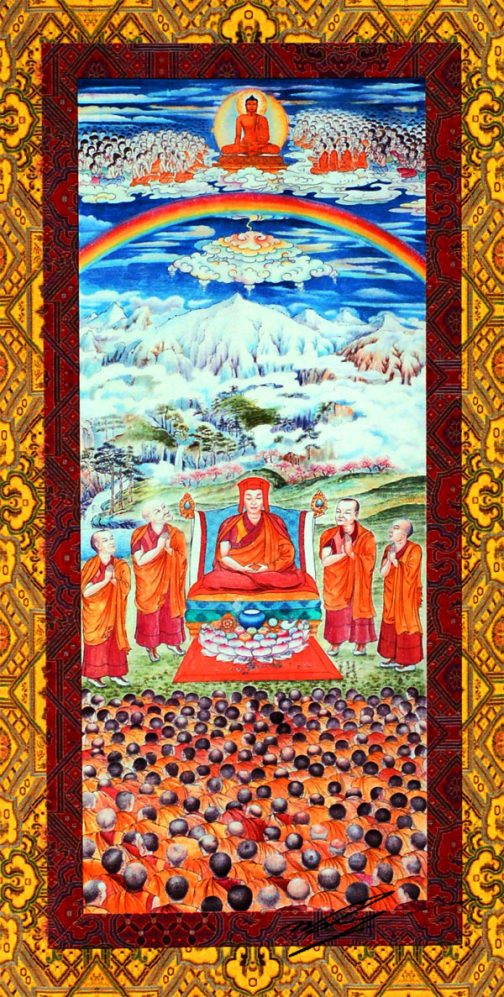
A painting of Gampopa surrounded by disciples by the Seventeenth Karmapa.
Having completed his studies, Phakmo Drukpa turned to practice and went to see one of the founders of the Sakya lineage, Sachen Kunga Nyingpo (1092-1158). Phakmo Drukpa requested instruction and also asked his same question about the root of samsara. Sachen Kunga Nyingpo’s answer touched him more deeply than those of the scholars. Then it was time for Phakmo Drukpa to meet Gampopa (Dakpo Lhaje) with whom he had a connection for many lifetimes.
When Phakmo Drukpa entered the presence of Gampopa, the master was eating balls of roasted barley flour (tsampa, a staple of Tibet). Following the custom, Phakmo Drukpa explained the history of his study and practice to Gampopa and offered an account of his experiences and realizations. Gampopa replied, “You didn’t get it. My lump of tsampa is worth more than your experience and realization.” Having just revealed his whole inner life to Gampopa, Phakmo Drukpa was rather vulnerable at this point, so this insult subdued his pride a bit.
Then Phakmo Drukpa said, “I have a question that I always ask: What is the root of samsara?” Gampopa replied, “Your present mind.” This evoked such a deep feeling in Phakmo Drukpa that right then and there he attained realization.
Why did Phakmo Drukpa have to wait so long? When the answer to his question was “ignorance,” it meant that he would have to study and find out what ignorance is. He would be looking outward while the root of samsara, his present, ignorant mind, was within, so he was looking in the wrong direction. When Gampopa directed Phakmo Drukpa’s awareness to the right place—his present mind—he immediately experienced the answer to his long-held question and attained realization.
His Holiness then summarized, “Ignorance can be found only in our present mind and nowhere else. We should reflect on this. We don’t need to study about what is truly existent or not truly existent. We will discover that phenomena are not truly existent by investigating our present consciousness itself.” The Karmapa closed with a caveat: “It is very difficult to weaken the hold of the mind that takes things to be real.”
Live Webcast recording of Mind Training teachings
The Karmapa’s teachings on The Eight Verses of Training the Mind were webcast live. You can watch the recording below or on YouTube.


